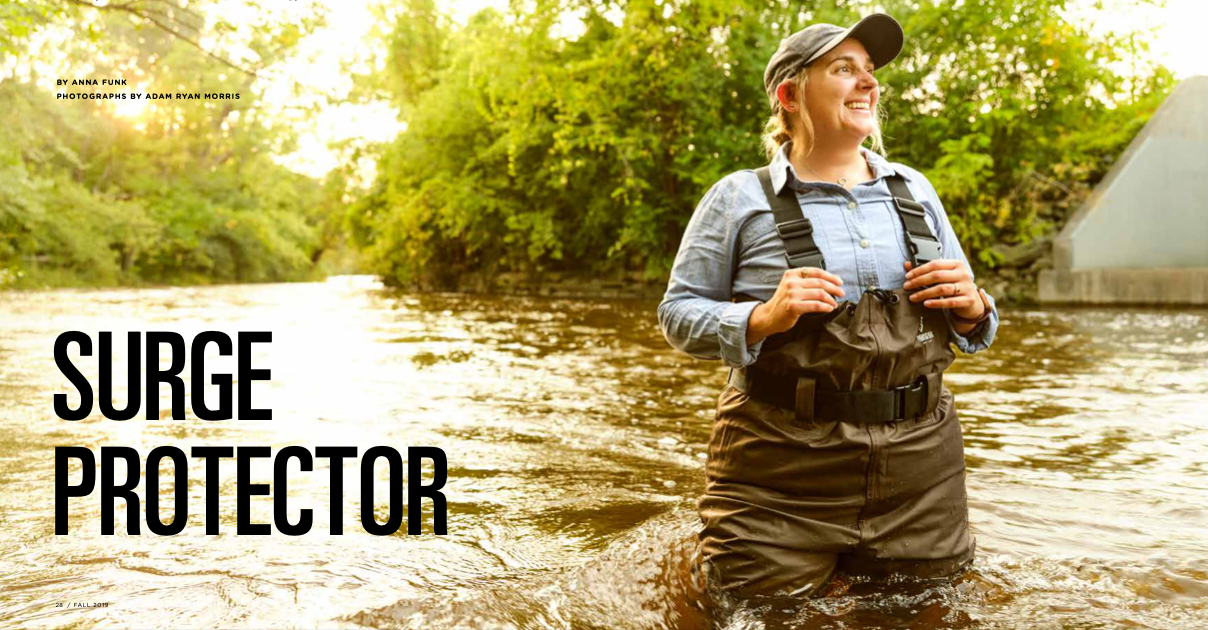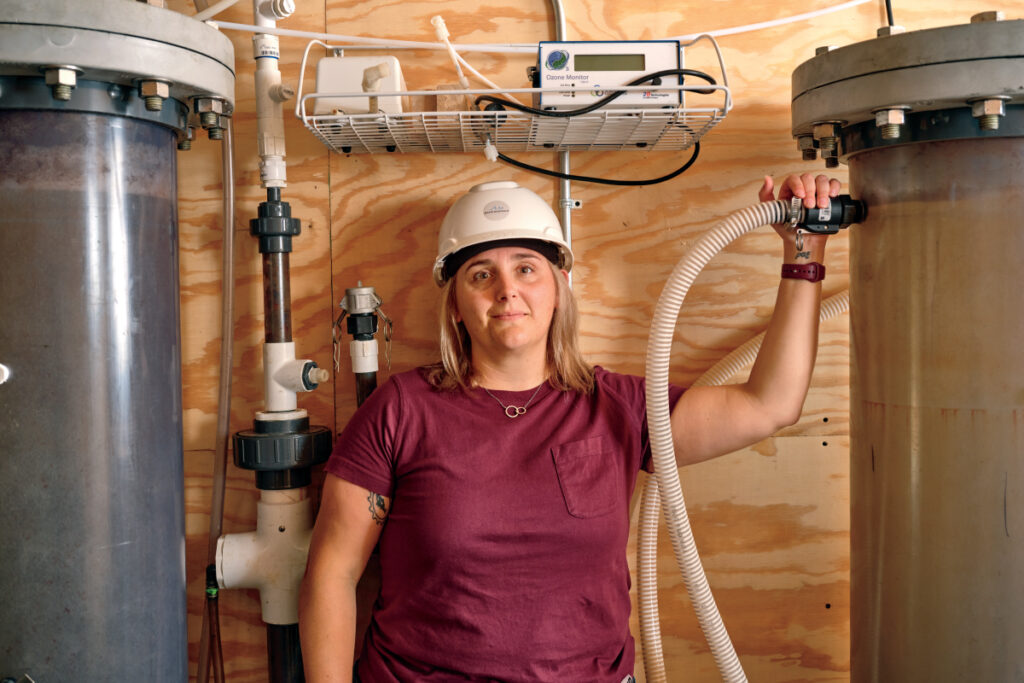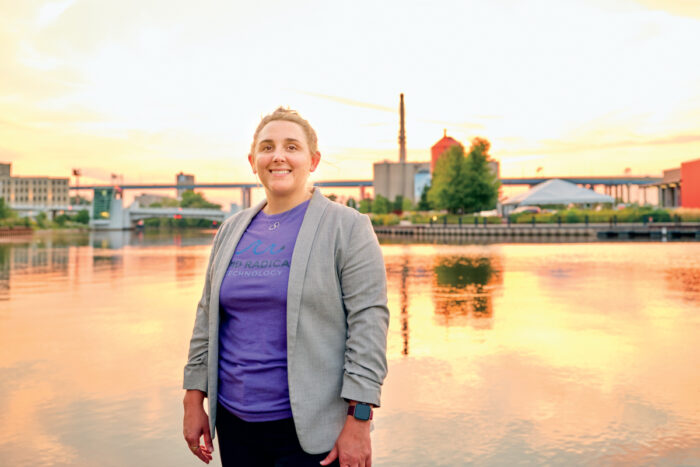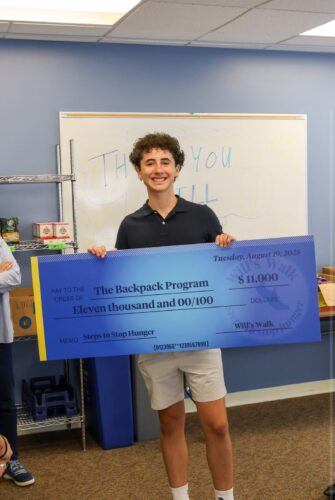
When environmental engineer Paige Peters, Eng ’11, Grad ’19, stopped by Marquette’s Engineering Hall years after her graduation to drop off wastewater samples for some routine lab testing, she didn’t expect to be called into her former adviser’s office. “I remember having this undergrad fear like, ‘Oh God, what did I do?’ before remembering I hadn’t been a student for four years,” Peters says.
Dr. Daniel Zitomer, chair and professor of civil, construction and environmental engineering, had just submitted a proposal to Milwaukee’s Water Equipment and Policy Center, a federally supported industry-university research center, and was wondering whether Peters would come back to grad school full time if he got the funding. Good timing, it turned out. “It was a golden offer,” she says. “I was already thinking about going back.”
Zitomer secured the funding and invited Peters to work on a project borne of personal frustration. Like a lot of Milwaukeeans, Zitomer had experienced a sewer backup in his basement during a historic storm in 2010. “His first thought was: There’s got to be some engineering solution to this,” Peters says. Less than a decade later, the ideas Peters began working on as part of that research project have exploded into a startup with well over a million dollars in funding, four employees and a whole lot of promise. Her mission: ultra-fast water treatment systems designed to handle the big surges of water that come with storms and floods. If she succeeds — when she succeeds — it will mean dry basements and protected local water quality, especially in cities with combined stormwater and sewerage systems like Milwaukee.
The two high-rate technologies that underpin Peters’ company, Rapid Radicals Technology, LLC, already existed, independently. But the novel premise of combining them to create a speedy yet effective treatment technology was alluring from the start. Utilities from Milwaukee, Chicago, Fond du Lac and Green Bay partnered with Marquette on the project — as did the U.S. Environmental Protection Agency — in a strong early display of market interest. The Milwaukee Metropolitan Sewerage District was first to suggest shrinking the footprint and installing the technology right at outfalls, where overflowing sewers empty into rivers and lakes.
Making the technology work was easier said than done. “I spent the entire first year just combining different chemicals, different doses, different timing, different rotations, all these different operating factors,” she says. She had to learn the ins and outs of each pollutant and its removal so she could ramp up the speed and make sure each process played nice with the other processes that would need to happen simultaneously.

She sorted things out, however. While a typical sewage treatment plant grinds away for eight hours to meet legally required performance specs in three key areas — organics removal, solids removal and disinfection — Peters soon had her process clicking. “By the second year, we had hit this proof of concept that ‘met permit’ for these three parameters in less than 30 minutes,” she says. She remembers joining Zitomer to share the news with some very impressed industry partners. “We get off the call and [Zitomer] looks at me and says, ‘You should start a company.’” Peters incorporated Rapid Radicals in 2016, earned her master’s degree three years later, and is now wrapping up her Ph.D.
The company has been popular with investors. Peters first earned $50,000 from Marquette’s Enterprise Seed Fund, a joint program with the Wisconsin Economic Development Corp. that awards startup funding to a student or faculty member each year. Then Rapid Radicals was awarded a research grant to build the pilot system, followed by a phase one grant from the National Science Foundation — $500,000 collectively. Then $1 million in funding followed from a National Science Foundation program for promising startups. This June, Rapid Radicals also won the grand prize in the Wisconsin Governor’s Business Plan Contest.
Peters’ pilot system lives in a bright blue shipping container at the South Shore Water Reclamation Facility in Oak Creek. If you didn’t look closely, you might miss the placard where Rapid Radicals sits next to Marquette’s logo and the phrase The Clean Water Machine. Inside, you’ll find tanks and pipes, a lab bench, a locker full of Peters’ tools (“my happy place,” she adds) and a Christmas tree (“because we’re very festive people”). The plant gives Peters and her team access to sewage and water, which they mix to different dilutions to simulate different sewer scenarios. When they’re done running tests on the system, the water and waste can go right back into the treatment plant for treatment.
The next pilot will be a little closer to home: Right in Milwaukee, near 59th and State on the Menomonee River, where Peters will test the tech with real sewer overflow water. Future installations are set for other discharge points in Milwaukee and Detroit, each featuring refinements, including Cryptosporidium and Giardia removal, that will bring Rapid Radicals closer to having a complete product.

Wicked Weather
“Wet weather is a wickedly complex problem,” Peters says. She’s thinking not just about the technological challenge of keeping overflowing sewage out of waterways, but also about how backed-up basements disproportionately occur in lower-income neighborhoods, where people will have the most trouble recovering. Add to this a changing climate that’s making weather events more extreme, and you’ve got a complicated issue. “It’s as closely tied to engineering as it is to poverty, and socioeconomic impacts on a community, and climate change. I have loved digging into all these different aspects of it.”
In a TEDx talk at Marquette, Peters has described how passion, talent, action and gratitude all contribute to her vision of “responsible impact.” She is motivated to bring clean water to her community and beyond — a radical impact.
Being a campus-based graduate student, an engineer working on site and a mission-driven CEO running a company is also wickedly complex. As a female scientist in a male-dominated field, she’s been underestimated, even once mistaken for a restaurant worker at an industry accelerator event. Those catching her pitches have assumed she must be her company’s founder, CEO or lead engineer, not all three. “It took me a long time to realize that when I was pitching as a CEO and founder, people didn’t realize I also am the engineer who created the technology. I had to start emphasizing that so people would know it’s my baby. I made her.”
Now, she’s hired a CEO to help Rapid Radicals run and grow, so she can focus on her real passion — the technology. That leaves Peters ready for more. She is motivated to bring clean water to her community and beyond, through it all.
One day, last August, she was in a hurry while running a test at the plant. “I remember the moment I opened a pipe to reconfigure it, and I saw the water in the pipe,” she says. “I thought: That’s so weird, that’s not supposed to be in there right now.” She had forgotten to turn off a valve and was suddenly faced with 50 pounds per square inch of spewing sewer water. She closed her eyes, closed her mouth and got the valve shut, but the damage was done. “I was just drenched,” she recalls. So, she swapped her soiled shirt for a safety vest, finished her work, cleared her schedule and went home.
“It wasn’t the first time that has happened. It’s really disheartening. And then that afternoon, I was sitting in my misery, thinking, ‘Oh, I hope I don’t get sick.’ Then I got the email from my National Science Foundation program director that my million-dollar proposal was going to be funded,” she says. “That’s the epitome of my life as an entrepreneur. You gotta run with it.”



